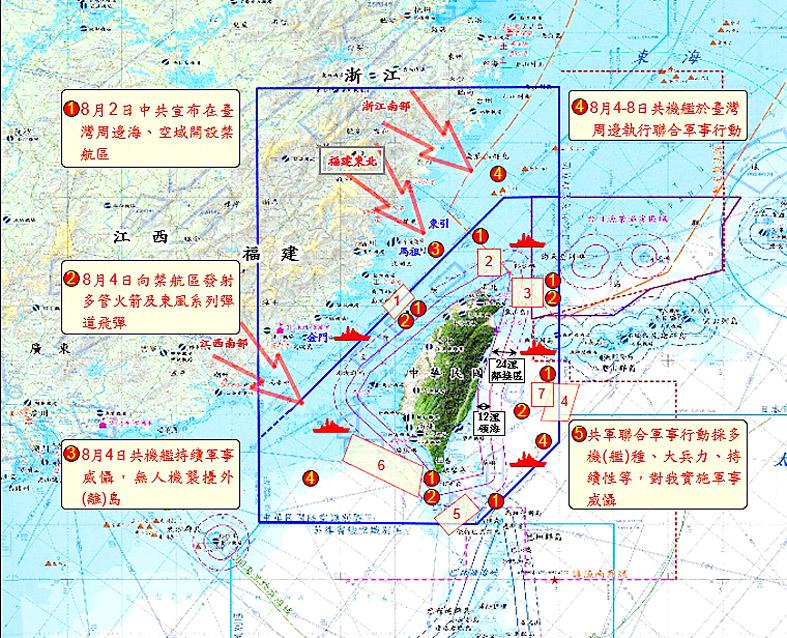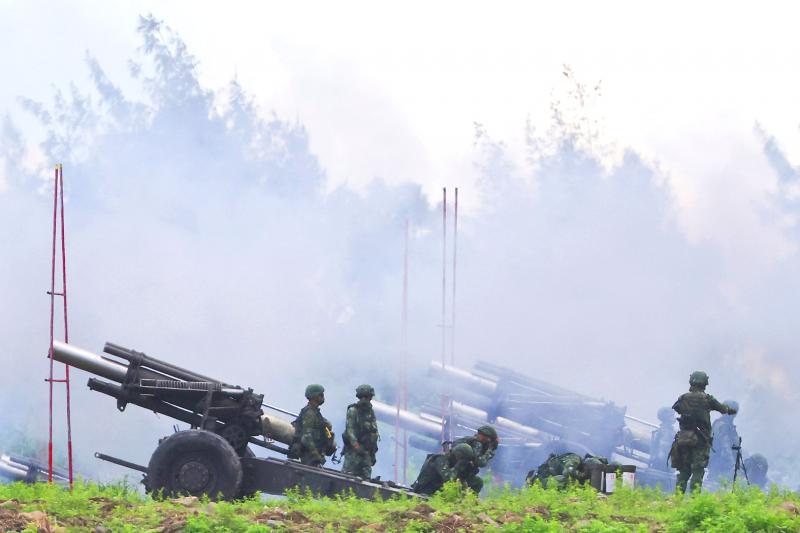Taiwan’s military leaders have launched a behind-the-scenes push for a NT$400 billion (US$13.34 billion) defense budget next year due to China’s increased military intimidation, a high-ranking official said yesterday.
Speaking on condition of anonymity, the official said that lawmakers had trimmed this year’s military budget from a proposed NT$372.6 billion to NT$367.6 billion before a surge in Chinese activity drove up the military’s operational costs.
Defense spending on fuel, maintenance and replacement parts has skyrocketed due to the numerous missions to intercept Chinese People’s Liberation Army (PLA) aircraft and ships, they said, adding that reserve funds have been activated multiple times this year.

Photo courtesy of the Ministry of National Defense
Last month, the Executive Yuan indicated its intent to boost the defense budget — which averaged 3 precent of GDP over the past five years — to 4.09 percent next year, which would add more than NT$15 billion to national defense, the official said.
Military leaders deem even this sum to be inadequate to meet the country’s need to augment its forces, as China’s drills now constitute a direct threat to national security, the source said.
The leaders believe that Taiwan should adopt emergency combat preparedness measures, a term encompassing accelerated arms procurement and other actions, the official said.

Photo: Ann Wang, Reuters
In 1996, then-president Lee Teng-hui (李登輝) ordered the implementation of the measures in response to the Third Taiwan Strait Crisis, they said.
The measures included medium-range surface-to-air missiles being converted into short-range surface-to-surface missiles and then rapidly deployed, and lease-then-buy deals for US-made electronic equipment and arms, they said.
Proponents of the combat preparedness measures believe the government must raise at least NT$400 billion for the military to implement them today with reasonable confidence of success, the official said.
The Ministry of National Defense is to submit its assessment of the China threat and the military’s current and future needs to the legislature with the Cabinet’s general budget proposal.

The manufacture of the remaining 28 M1A2T Abrams tanks Taiwan purchased from the US has recently been completed, and they are expected to be delivered within the next one to two months, a source said yesterday. The Ministry of National Defense is arranging cargo ships to transport the tanks to Taiwan as soon as possible, said the source, who is familiar with the matter. The estimated arrival time ranges from late this month to early next month, the source said. The 28 Abrams tanks make up the third and final batch of a total of 108 tanks, valued at about NT$40.5 billion

A group from the Taiwanese Designers in Australia association yesterday represented Taiwan at the Midsumma Pride March in Melbourne. The march, held in the St. Kilda suburb, is the city’s largest LGBTQIA+ parade and the flagship event of the annual Midsumma Festival. It attracted more than 45,000 spectators who supported the 400 groups and 10,000 marchers that participated this year, the association said. Taiwanese Designers said they organized a team to march for Taiwan this year, joining politicians, government agencies, professionals and community organizations in showing support for LGBTQIA+ people and diverse communities. As the first country in Asia to legalize same-sex

Travel agencies in Taiwan are working to secure alternative flights for travelers bound for New Zealand for the Lunar New Year holiday, as Air New Zealand workers are set to strike next week. The airline said that it has confirmed that the planned industrial action by its international wide-body cabin crew would go ahead on Thursday and Friday next week. While the Auckland-based carrier pledged to take reasonable measures to mitigate the impact of the workers’ strike, an Air New Zealand flight arriving at Taipei from Auckland on Thursday and another flight departing from Taipei for Auckland on Saturday would have to

MOTIVES QUESTIONED The PLA considers Xi’s policies toward Taiwan to be driven by personal considerations rather than military assessment, the Epoch Times reports Chinese President Xi Jinping’s (習近平) latest purge of the Chinese People’s Liberation Army (PLA) leadership might have been prompted by the military’s opposition to plans of invading Taiwan, the Epoch Times said. The Chinese military opposes waging war against Taiwan by a large consensus, putting it at odds with Xi’s vision, the Falun Gong-affiliated daily said in a report on Thursday, citing anonymous sources with insight into the PLA’s inner workings. The opposition is not the opinion of a few generals, but a widely shared view among the PLA cadre, the Epoch Times cited them as saying. “Chinese forces know full well that